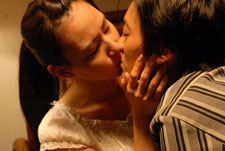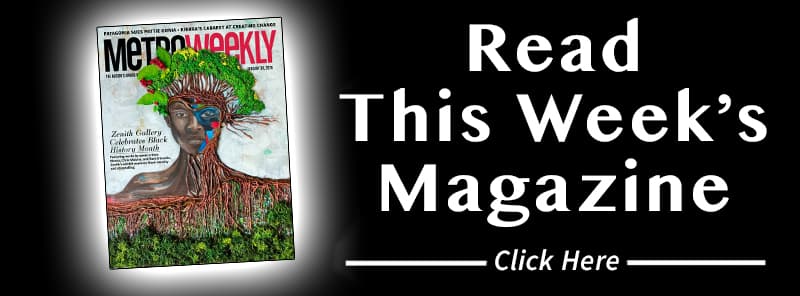Drifting Flowers
Reel Affirmations 2008
Piao Lang Qing Chun
Review by Kristina Campbell
Rating: 


 (4 out of 5)
(4 out of 5)
Thursday, 10/23/2008, 9:00 PM
Feature presentation, $10 at 6th & I Synagogue
Mandarin and Taiwanese with English subtitles
THREE INTERWOVEN segments comprise Drifting Flowers, a series of love stories set in Taiwan that highlight love, sacrifice and heartbreak.

In the first segment, young Meigo develops a schoolgirl crush on Chalkie, the butch accordion player who accompanies her sister Ging, a blind singer reliant on Meigo but also burdened with raising the young girl. Chalkie befriends Meigo but quickly grows close to Ging, creating an intergenerational (and partly platonic) love triangle. In the end, difficult decisions must be made about Meigo’s care and Ging’s freedom to live her life with the woman she loves. The segment closes with Chalkie and Ging performing at a wedding, where we learn the bride and groom are entering a marriage of convenience — bride Lily is in love with her butch friend Ocean, while groom Yan is more interested in his groomsman.
The second segment follows Lily and Yan in their later years, when Lily is suffering from Alzheimer’s and Yan has contracted HIV. Ocean and Yan’s lover are gone — it’s never made clear what happened to Ocean, but Yan finds himself alone after pushing away his lover, who then turned to another man. Finding little purpose left for his life, Yan makes a what seems to be intended as a farewell trip to see Lily, his legal wife. There he discovers a most beautiful way to placate her agitated heart and mind while finding for himself a sense of purpose, even if it comes at a significant cost.
In segment three, we are transported back to Chalkie’s high school days, watching her struggle against the gender-based expectations of her family, including an uncomfortable scene where she unbinds her breasts to try on a bra her mother has begged her to wear. Chalkie has a clear sense of who she is and soon ends up finding a first love with someone we’ve met before, bringing the film full circle.
Although some of the singing in the opening scenes leaves much to be desired, hang in there: The acting is superb, from spirited young Meigo to the confident and reassuring adult Chalkie, from the befuddled and lovelorn Lily to the weary and lonely Yan.
Drifting Flowers relies on some clichéd lesbian stereotypes and heavily pushes the butch-femme dynamic, but the character development makes it work, particularly given the cultural context and the years in which the movie is set.
The film might flow better as a linear story, starting with Chalkie and Lily’s youthful encounter and following them as they branch out. It would be good, for instance, to know more about Meigo’s relationship with Ging and Chalkie after some years pass; it would help to know what happened to Ocean. Instead we’re given only fleeting scenes hinting at answers to some of these questions, and the jumbled presentations of the storylines is more of a distraction than it needs to be.
Support Metro Weekly’s Journalism
These are challenging times for news organizations. And yet it’s crucial we stay active and provide vital resources and information to both our local readers and the world. So won’t you please take a moment and consider supporting Metro Weekly with a membership? For as little as $5 a month, you can help ensure Metro Weekly magazine and MetroWeekly.com remain free, viable resources as we provide the best, most diverse, culturally-resonant LGBTQ coverage in both the D.C. region and around the world. Memberships come with exclusive perks and discounts, your own personal digital delivery of each week’s magazine (and an archive), access to our Member's Lounge when it launches this fall, and exclusive members-only items like Metro Weekly Membership Mugs and Tote Bags! Check out all our membership levels here and please join us today!



























